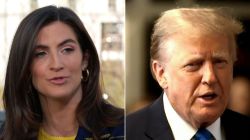Attorney General William Barr said special counsel Robert Mueller did not ask him or Congress to come to a determination on whether President Donald Trump obstructed justice, but that he made a conclusion there wasn’t a case to prosecute because “that’s generally how the Department of Justice works.”
Barr also told a Senate subcommittee that spying on the Trump campaign occurred and that he’s undertaking a review of the origins of the counterintelligence investigation into members of the Trump campaign and Russia to determine whether there was “unauthorized surveillance.”
“I think spying on a political campaign is a big deal,” Barr said. “I am not saying that improper surveillance occurred. I’m saying that I’m concerned about it and looking into it, that’s all.”
Barr was back on Capitol Hill Wednesday for a second day of testimony on the Justice Department budget, this time before a Senate Appropriations Subcommittee, but once again special counsel Robert Mueller’s report dominated the conversation. Democrats pressed Barr to explain his decision not to prosecute on obstruction of justice, after Mueller reached no conclusions but wrote that the investigation did not exonerate Trump, according to Barr’s summary.
Barr wouldn’t respond to the questions, saying he would be able to explain in more detail once Mueller’s report was released. But he acknowledged he didn’t know whether Mueller agreed with him.
“I don’t know whether Bob Mueller supported my conclusion,” Barr said. “I am not going to sit here and try to characterize his reasoning or his report, that’s why it’s important to get the whole report out instead of trying to read these little tea leaves.”
Barr did say that Mueller did not ask him to make a conclusion, as part of his underlying argument that it was his role as attorney general to do so.
“Generally, grand juries are to investigate crimes and a prosecutor’s role at the end of the day is binary,” Barr said. “Are there charges, or no charges? Or, is this a crime or not a crime?”
For several other questions, such as whether the White House was briefed on the Mueller investigation, Barr also stuck to his line that he would be able to offer more explanation once the report is out, which he said was likely next week.
Still, his testimony did elicit some new hints about what he will put out from the Mueller report.
Barr told the panel, for instance, that his decision to redact information about the “personal privacy and reputational interests of peripheral third parties” did not apply to Trump.
“No, I’m talking about people in private life, not public office,” Barr said.
Barr also suggested that the report would not be filled with pages of redactions. “You will get more than the gist,” he told the panel.
At Tuesday’s House hearing, Barr said he expected to release a redacted version of the Mueller report within a week, with plans to color-code redactions and provide an explanation for why material was not released publicly.
But Barr sparred with House Democrats who pressed him on why he would not release grand jury material or provide the full, unredacted Mueller report to Congress.
“I don’t intend at this stage to send the full, unredacted report to the committee,” Barr said, adding that wouldn’t ask a court to release grand jury material “until someone shows me a provision” that allows it to be released.
Barr stuck to his argument Wednesday, saying the restriction on including grand jury material that Democrats are demanding is “inflexible under the law.”
In the House, Barr was squaring off with Democrats who have subpoena power and have already authorized a subpoena in the Judiciary Committee to obtain the full Mueller report and underlying evidence. Democratic lawmakers expressed frustration after the hearing that Barr wouldn’t answer certain questions, such as whether the White House had been briefed about the Mueller report.
Senate Democrats also argued to Barr that he could provide Congress with grand jury material, saying Barr was within his discretion to go to court to do so.
“I think attempts to hide swaths of the report from public scrutiny along the way will only fuel suspicions that have been raised by many that the Justice Department, which represents the United States, is playing the role of President Trump’s defense team,” said Sen. Patrick Leahy, the top Democrat on the Senate Appropriations Committee. “Your imprint on the course of justice, the rule of law, in these moments, are going to be scrutinized long after both you and I are gone from public service. The only way out in my view is transparency.”
Republicans, however, suggested that providing grand jury material confidentially to Congress could result in it being leaked.
“Can we agree there is a material risk that the grand jury information would leak?” asked Sen. John Kennedy of Louisiana.
“I think so,” Barr responded.
Barr’s decision to review the beginning of the 2016 counterintelligence investigation into the Trump campaign, which was reported after his testimony Tuesday, was a topic of interest to both Democrats and Republicans.
Barr said he wanted to look at all of the investigations that have already probed the matter, including Congress and the Justice Department inspector general, and see if any areas need additional investigation.
“One of the things that I want to do is pull together all the information from the various investigations that have gone on, including on the Hill, and in the department, and see if there are any remaining questions to be addressed,” Barr said.
Barr later said he did not have evidence that wrongdoing occurred in the Justice Department or the FBI, but he did have questions and concerns about what happened.
“I have no specific evidence right now that I would cite. I do have questions about it,” Barr said, adding there could be “abuses that may not rise to the level of a crime.”
This story has been updated with additional developments Wednesday.


















